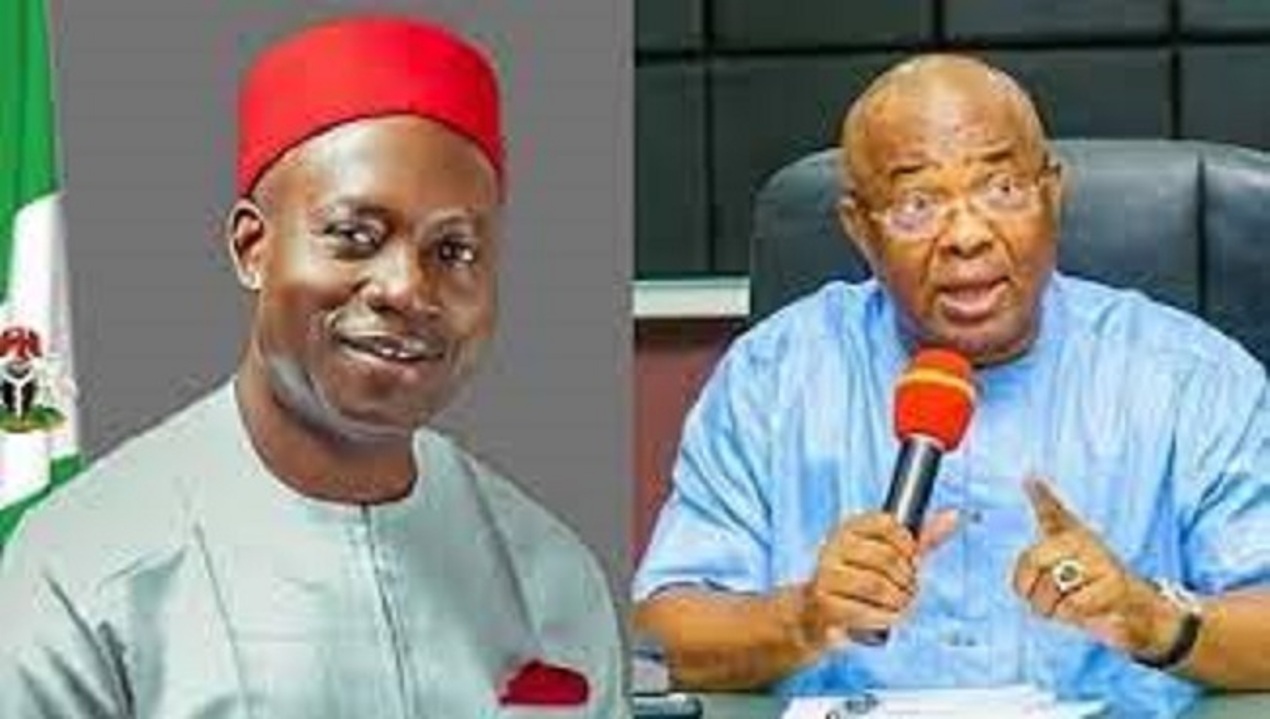Anambra State Governor, Charles Soludo and his Imo State counterpart, Hope Uzordimma have disagreed on state police, but agreed on the dysfunctional nature of the national security architecture.
Both spoke at the session on Traditional and Non-Traditional Security Intervention, Early Conflict Identification, Prevention, Management and Resolution on day two of the 2023 induction for re-elected and elected governors with the theme”Governing for Impact (Building Sub-national Governance)” organised by the Nigeria Governors Forum (NGF) at the Presidential Villa, Abuja.
While Soludo noted that even though the governors bear the responsibility of funding security agencies in their domain, they have no control over their operations, referring to state executives as generals without troops, welcoming the decision by the President-elect, Bola Tinubu to support state police.
Uzodimma, on his part said, considering the current economic realities, some states would not be able to fully fund their security architecture, calling instead for cooperation between the federal and subnational authorities, saying governors must be on the same page with the commander-in-chief.
Soludo, who lamented the disproportionate burden placed on state governments while lacking the necessary resources to combat the rising insecurity, stressed the need for local authorities to address rising insecurity in the country.
The Anambra governor said security issues were localised and that every locality has its own peculiarities.
“The most fundamental issue, I think for those of us who are governors, and the governors-elect, a major concern that we need to get onto is the national security architecture and the moderator aptly pointed that out, places much of the kinetic architecture almost exclusively on the shoulders of the Federal Government, and whereas the states are called upon as chief security officers, but you aptly call us generals without troops, and therefore, state governors have to…I mean, what we’ll be discussing from the point of view of these places are coping mechanisms.”
Soludo asked: “How do we cope, how do cope to survive in a dysfunctional system because the architecture is dysfunctional? And it is such an architecture that the problems we face are very local, requiring our local actions, but the instrument is out there. The other thing is funding in the whole architecture, the Federal Government, which has a near monopoly of these agencies, cannot fund them. And then they have to foist on the states again, to be the ones to provide the funding but which is also not very accountable system.”
On his administration’s intervention in the state, he said: “I’m just a one-year-old baby on the job. Before I assumed office, it was so clear to me about the nature of the dysfunctionality, but how we must cope to survive.”
Uzodimma, while supporting Soludo’s submission, however, advised that on matter of security, governors should be on the same page with the president because he is the Commander-in-Chief.
“I want to agree with the governor of Anambra State, Professor Soludo. I really want to add that security as it has to do with state governments and Federal Governments should be defined very properly. First of all, our country, the Republic of Nigeria, is made up of 36 states. There’s no part of this country that does not belong to one state or the other inclusive of FCT and the Commander-in-Chief, who is the head of all the security agencies, Mr. President, is responsible for the provision and management of security in the country.”
He called for the reorientation of citizens to know that they share in the successes or failure of the Federal Government security architecture.
Uzordinma said: “I took time to study various security challenges and the type that is prevalent in South East, particularly Imo State, where I come from, may not exactly be the same thing as the kind of security challenges in Anambra State, up to Enugu and Ebonyi states. But the common problem I have been able to see is the funding gaps among the agencies.
So, in order not to waste our time on too much monitoring of the state governments, if we can tackle the funding gap that exists among these security agencies and fund them early enough, I think as a matter of fact, the idea of having a general without a troop will disappear because you know as we always say, who pays the piper dictates the tune. So, in that case, you will forge a relationship between the various security agencies in the state.
To properly solve the problem of operational challenge, funding alone is not enough. There will also be a connection between the Federal Government security architecture like he has just said, the kinetic approaches.
The non-kinetic approaches is forming alliance with the traditional rulers and the diverse community of quality intelligence gathering and making this information available to security agencies so they can deploy. But what is remotely behind most of the challenges we see is unemployment and hunger. Just like he observed, between last year and this year, we have been to pull out over 200,000 young men and women from the unemployment market through our skilled up programme of digital economy.
So, if we can employ our young boys and girls and sometimes they become employers of labour, they will be busy and when they are busy they will add value to the society.”
Meanwhile, the National Security Adviser, Gen. Mohammed Munuguno, Director General of the Department of State Security (DSS), Bichi Mogaji and the Inspector General of Police, Usman Baba Alkali has give security advisory to the new governors.
The NSA represented by Joseph Dahwuep, appealed to the incoming governors to adopt good governance policy as part of the security issues in the states are fallout of some of the polices from the states. He further advised that they form an inclusive cabinet and not stereotype any group as opposition to their administration.
According to the NSA: “Election are over; this is the time for good governance. Please, endeavour to ensure an inclusive government to enable you have a good governance at the state levels. Nigeria is not an exception to insecurity. Insecurity is a global item now. Security includes good governance and human rights of all. Security includes reducing poverty and unemployment at the state levels. Without security, there won’t be security.”
Giving an overview of the security situations, the NSA said to tackle insecurity involves both kinetic and non-kinetic measures, and advised that it wa easier to manage insecurity when they listen to early warning signs from stakeholders.
He urged them to identify the stakeholders in their respective states and make adequate use of them, while encouraging a feedback mechanism that keep them abreast of developments in their states.
On conflict management and resolution, the NSA urged the governors to always use intelligence reports and management early warnings sent to them daily.
The NSA further told the incoming governors to bear in mind that crimes and criminal activities have been digitised hence the need to develop a system that works for all.
In his advisory, DSS director general, represented by Tier Mohammed, urged the incoming governors to always work on early warnings and endeavour to go through reports presented to them by their special aides.
He recalled how a governor in 2003 lost re-election because he failed to go through security report on scarcity of water and its implications and his opponent saw the report and used it to his advantage and provided water to the community which led to his election instead.
He also urged the governors to listen to traditional rulers and informants, asking them to pay attention to strangers who infiltrate communities in their states and find out who they are.
The DSS boss said kinetic force was not the best and urging the governors to make use of dialogue to avert crisis. He also appealed to them to always be accessible to all citizens.
In his advisory, the IGP who was represented by an Assistant Inspector General of Police, Bala Ciroma, called on the governors to endeavour to reduce poverty and unemployment as an angry man is a hungry man.
He also urged them to be technologically savvy as criminals now use telephones and other technological equipment in their dangerous trade.




